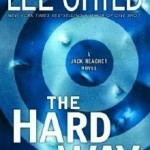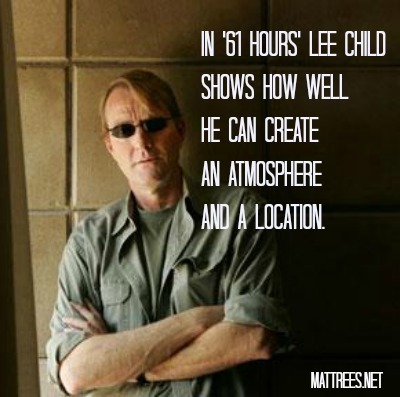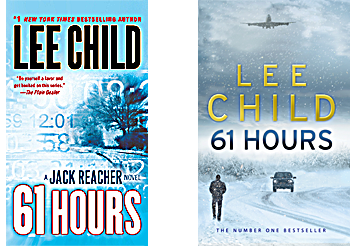Matt Rees's Blog - Posts Tagged "lee-child"
Times thriller roundup: Omar Yussef 'most beguiling of current sleuths'
Set in a pulsating, multicultural city, Matt Rees’s The Fourth Assassin relocates his Palestinian series hero Omar Yussef to a wintry New York, where a UN conference provides a pretext for visiting his son Ala; but when he reaches Ala’s Brooklyn apartment, he discovers the headless body of one of his roommates. Yussef teams up with a local cop to investigate, and confirms his status as one of the most beguiling of current sleuths as they try to establish whether the victim was killed by a drug dealer, a romantic rival or an Islamist cell intent on a high-profile assassination.
There's also a review of Sophie Hannah's latest. I did a joint reading with her last year in a remote spot in Derbyshire. Her novel was about infidelity. She confessed that she'd probably have an affair with any man who asked her to do it in the afternoon, but complained that such offers usually come late at night when she really just wants to sleep. I thought it was the most refreshing perspective on extramarital affiars I've heard for a long time and probably a good tip for would-be philandering males.
The other reviews include new ones from Nicci French and Lee Child.
Published on April 05, 2010 00:30
•
Tags:
brooklyn, crime-fiction, derbyshire, drugs, islamists, jenny-cooper, joan-brady, john-dugdale, joseph-kanon, lee-child, london, matt-rees, new-york, nicci-french, peter-temple, reviews, sophie-hannah, sunday-times, the-fourth-assassin, thrillers, times-online
Why thriller titles...aren't
 Thriller titles often seem designed to confuse prospective readers. Pick up a book by a well-known author, read the title which is something like “Better Off Dead,” and you’re likely to think: “Did I already read that one?
Thriller titles often seem designed to confuse prospective readers. Pick up a book by a well-known author, read the title which is something like “Better Off Dead,” and you’re likely to think: “Did I already read that one?It seems to me titles in the thriller world have moved away from any kind of descriptive or even tangential link to the plot or characters of the book. They have become in many cases an adjunct to the cover design. A “blurb” (the laudatory comments dashed all over the jacket by other writers or reviewers) distilled to two or three words. As though the title were only there as encouragement to a purchase, rather than being part of the book itself.
There are plenty of examples among today’s top writers. But let’s take the example of Lee Child’s excellent Jack Reacher novels. I just caught up on a couple I’d missed. They’re called “Without Fail” and “Nothing to Lose.”
“Without Fail” is about a plot to assassinate the Vice President of the US. I couldn’t tell you why it’s called “Without Fail.” As far as I remember, no one says “without fail” or tells Reacher he has to do something “without fail.” He drinks coffee at every opportunity – without fail, you might say – but I don’t think that’s why Child called the book “Without Fail.”
In “Nothing to Lose” Reacher finds himself in rural Colorado investigating a dead body he stumbles across in the desert. I was left unsure which of the characters had “nothing to lose.” Perhaps it was Reacher, or the people (no spoilers here) who turn out to be involved in the thing he’s investigating. Or maybe it’s the reader in the airport bookshop…
In any case, these latest two come on the back of my earlier Reacher reading, where I pondered why “Running Blind” was called “Running Blind” (despite the tagline on the cover which said something like, “Reacher doesn’t know what the hells’ going on, in fact he’s RUNNING BLIND”. Even though Reacher seemed to know what was going to happen in that book a long time before everyone else.) I still don’t know why “Worth Dying For” was called “Worth Dying For,” because Reacher never seems about to die and the people who actually die do so for despicable reasons that aren’t worth dying for.
“61 Hours” was called “61 Hours” because it took the form of a countdown. But why 61 hours? Pretty arbitrary, but at least when I stand before a shelf of Child books in a store I’m able to remember that I’ve read that one. Otherwise I get confused. It’s almost as though publishers want thrillers to have such vague titles that befuddled readers will buy the same book twice.
My novels have titles related to the theme or events or characters of the book. If you’re looking at a shelf of my books and you’ve read some of them, you’ll recall that “A Grave in Gaza” was the one set in Gaza; that “The Collaborator of Bethlehem” was about a collaborator and was set in Bethlehem. “The Samaritan’s Secret” was about a secret held by a Samaritan. If you haven’t read “The Fourth Assassin,” you’ll run mentally through the books you have read and think: “They didn’t have four assassins in them, but this one does, so I haven’t read it yet. Let’s buy it.” And you wouldn’t come to the end of the book saying to yourself: “Hey, I only counted three assassins,” or “Hey, there weren’t any assassins in the book at all. Were there?”
Read the rest of this post on my blog The Man of Twists and Turns.
Published on September 08, 2011 04:00
•
Tags:
charles-dickens, crime-fiction, franza-kafka, greg-iles, jane-austen, joseph-heller, lee-child, leo-tolstoy, thrillers, titles
Megaselling Thriller Writers' Brutal Sked
 I’ve always considered myself lucky to be a writer. True, I work long hours…compared to the purely idle rich or to a top soccer player who puts in a tough 90-minute week. But essentially the burden on a writer is less the hours spent at writing – which ought to be fun – and more the occasional pondering about one’s self-worth, about one’s writing itself, and about one’s status in the author’s pantheon from piffling to powerful.
I’ve always considered myself lucky to be a writer. True, I work long hours…compared to the purely idle rich or to a top soccer player who puts in a tough 90-minute week. But essentially the burden on a writer is less the hours spent at writing – which ought to be fun – and more the occasional pondering about one’s self-worth, about one’s writing itself, and about one’s status in the author’s pantheon from piffling to powerful.Which is why I was amused by the caption to The New York Times’s article this weekfeaturing crime writers who’re now being asked by publishers and agents to write short stories and extra features to help publicize their novels – or even to write a second novel a year. (In the print version, though not on the web) the caption told us that Lisa Scottoline works “a brutal writing schedule” which sees her tapping away from 9 a.m. “until Colbert” comes on at 11.30.
My great-grandfather had a brutal schedule working in a Welsh coal mine. The Chinese who make the little plastic thingamy bits of crap I toss out every day have a brutal schedule. A hooker has a brutal schedule. For your schedule to be brutal, your work also has to be brutal.
No writer has a brutal schedule. In fact, no one who works in an office has a brutal schedule. Long hours in an office are boring, but not brutal.
The Times article led me to consider the pressure on (and personality of) the mega-selling thriller writer type. I’ve bumped into a few of them at book fairs. I’ve found them to be mostly contented, charming and fun, and yet… they all seem to feel a good deal of pressure from agents and publishers. In the past (and still, no doubt) that pressure was limited to the desire of the agent and publisher that Ms. Megaseller would resist the temptation to write a standalone novel and come up with another in their hugely popular series. The writers in question never seemed keen to do yet another installment of “McIrishname and the Gimp,” or whatever their series was called. I found it more than mildly astonishing that even with millions in the bank, all these writers claimed to find it hard to resist the blandishments of their publishers.
As if the nearly bankrupt denizens of the publishing fraternity would dump Ms. Megaseller if she put McIrishname and the Gimp out to grass for 18 months, while she knocked out a stand-alone about a murder during the Westphalian pumpernickel crisis of 1384. (I’ve a mind to send a proposal on that to my agent…)
Equally: as if publishers might put aside their fear of a future of thin e-book margins and dump Ms. Megaseller if she didn’t write two novels in a year.
Now I’ve been known to do a bit of extra stuff for my good readers. I’ve made videos for my books. I’ve put out some short stories for Kindle. I’ve even recorded an album of original songs about my books. I’m willing to go that extra mile. But there’s a risk to producing more than…well, more than I produce.
Some time ago I asked my agent — while she was lunching me on sushi on Park Avenue during a three-week break in my brutal writing schedule – if she thought I should try to write two books a year. I pointed out that I was quite efficient and that I wrote quickly and didn’t really work very long hours. I could up the productivity, perhaps, if she thought it’d be good for my career. She told me I shouldn’t.
“Because one of the two novels a year might be crap?” I asked.
“Weeeeell, no,” she said. She’s very polite. She’s from the Midwest.
I twigged. “Ah, you’re worried BOTH of them might be crap.”
She nodded and pushed the sushi boat my way.
Writing too much during the course of a day drains the creative energy. Larry McMurtry has said you ought to stop before you’re played out, because otherwise you’ll be mentally too exhausted to pick up and continue the next day. I assume McMurty quits long before Colbert comes on. (I assume that, as a 76-year-old who lives near Wichita Falls, Texas, old Larry’s in bed before Colbert comes on.)
The message implicit in the Times’s quote from an Oregon lawyer who downloaded a short-story by Lee Child that was a teaser for a forthcoming novel (“I’ll give anything he writes a shot”) is that it doesn’t matter if a mega-seller writes crap. (Notice the appreciation and, yet, the lack of enthusiasm in that quote.) Plenty of people will still download it.
Michael Caine once said that he made three movies a year. A brutal schedule. “Two of them may be rubbish,” he said, “but one of them will be good, and that’s the one people will remember.” It won’t work that way for books. (Unless maybe you get a stable of little writer- chimps to bang them out for you, and even that doesn’t seem to work on a literary level, though they do sell, which proves my point. Anyhow that’s for another blog post.)
Meanwhile, I’m working on a short story about Caravaggio, which I intend to publish for digital download shortly before the July 1 UK publication of my novel about the great Italian artist “A Name in Blood”.
I assure you, it’s not crap.
Published on May 19, 2012 09:49
•
Tags:
crime-fiction, lee-child, lisa-scottoline, thrillers, writers, writing
If you read only one Lee Child thriller, read '61 Hours'
Child’s evocation of the Dakota winter shows how well he writes

Lee Child is justly famous for creating a compelling main character in the loner Jack Reacher and for building plots that turn the pages for you -- and fast.
In 61 Hours Lee Child shows how well he can create an atmosphere and a location. The frozen tundra of Dakota is the setting and it’s almost a character in the plot. After I read 61 Hours I went back to some other Child novels and saw that he had written just as strongly about the often lonely locales of Nebraska and Indiana in other Reacher books. But it hadn’t struck me quite as forcefully as the chilly reaches of Dakota. Still it was there and it demonstrates the quality of Child’s work.
 It also highlights the deftness of Child's writing in general. Reviewers write about Child as the ultimate page-turner. It's a guilty pleasure, writes one chap in The Guardian, that comes out in conversation only when you realize that others are addicted.
It also highlights the deftness of Child's writing in general. Reviewers write about Child as the ultimate page-turner. It's a guilty pleasure, writes one chap in The Guardian, that comes out in conversation only when you realize that others are addicted.
I don't see it that way, and 61 Hours demonstrates why. Page-turner, I think, implies that the writing doesn't get in the way. It doesn't make you pause to think: "What does the writer mean by this phrase?" Yet without bogging down in too much description, Child creates a visceral sense of the Dakota winter.
In fact the sense of place in Child's books is at least as strong as the sense of Reacher as a character. Often the titles of Child's novels are a bit forgettable (though '61 Hours' is memorable because it relates to something specific within the plot). So the way I remember them is, "Oh, that's the one that takes place in Boston and in a remote spot in Maine." You see, the anchor is the place.
Perhaps that's because Child is a Brit living in America. Maybe it gives him a heightened awareness of place.
All the Jack Reacher books are wonderful. Which is your favorite? Let me know.

Get a FREE ebook of my crime stories.
Read more If you read only one... For the indispensable book by each big thriller writer.

Lee Child is justly famous for creating a compelling main character in the loner Jack Reacher and for building plots that turn the pages for you -- and fast.
In 61 Hours Lee Child shows how well he can create an atmosphere and a location. The frozen tundra of Dakota is the setting and it’s almost a character in the plot. After I read 61 Hours I went back to some other Child novels and saw that he had written just as strongly about the often lonely locales of Nebraska and Indiana in other Reacher books. But it hadn’t struck me quite as forcefully as the chilly reaches of Dakota. Still it was there and it demonstrates the quality of Child’s work.
 It also highlights the deftness of Child's writing in general. Reviewers write about Child as the ultimate page-turner. It's a guilty pleasure, writes one chap in The Guardian, that comes out in conversation only when you realize that others are addicted.
It also highlights the deftness of Child's writing in general. Reviewers write about Child as the ultimate page-turner. It's a guilty pleasure, writes one chap in The Guardian, that comes out in conversation only when you realize that others are addicted.I don't see it that way, and 61 Hours demonstrates why. Page-turner, I think, implies that the writing doesn't get in the way. It doesn't make you pause to think: "What does the writer mean by this phrase?" Yet without bogging down in too much description, Child creates a visceral sense of the Dakota winter.
In fact the sense of place in Child's books is at least as strong as the sense of Reacher as a character. Often the titles of Child's novels are a bit forgettable (though '61 Hours' is memorable because it relates to something specific within the plot). So the way I remember them is, "Oh, that's the one that takes place in Boston and in a remote spot in Maine." You see, the anchor is the place.
Perhaps that's because Child is a Brit living in America. Maybe it gives him a heightened awareness of place.
All the Jack Reacher books are wonderful. Which is your favorite? Let me know.

Get a FREE ebook of my crime stories.
Read more If you read only one... For the indispensable book by each big thriller writer.
Published on March 25, 2014 05:38
•
Tags:
crime-fiction, crime-novel, how-to-write, if-you-read-only-one, lee-child, thriller



